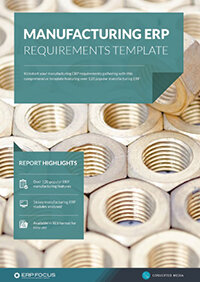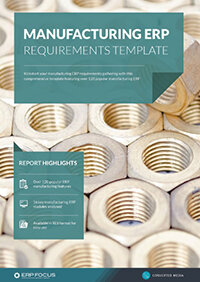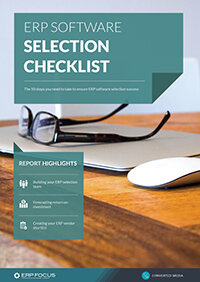Consider these features when comparing chemical ERP software
In its 2016 ERP Report on ERP Systems and Enterprise Software, ERP consulting and research firm Panorama Consulting Solutions LLC notes “there has been no other time in history when organizations have had so many enterprise software options.”1. Yet when it comes to making comparisons between vendors of ERP software, nothing trumps an industry-specific solution for chemical manufacturers.
Your complex operation requires an ERP solution designed specifically for your needs, not a virtual experiment where the vendor takes a generic product and modifies its functionalities, with a less-than-spectacular result. Here are three areas to investigate during your ERP software search and reasons for using ERP software specific to process manufacturers in the chemical industry.
Formula/recipe versus BOM
A common misconception among manufacturers is that formulation and bills of materials (BOMs) are the same. They are not. A chemical manufacturing company works with formulas and recipes (formulation) to create its products via a process that calls for the measuring and blending of various ingredients according to different units of measure, such as gallons, liters and pounds. Formulations may also include instructions to be incorporated into the process. Also, unlike a discrete manufacturer, chemical products cannot be unassembled into their original components once they’re mixed.
Recommended reading: make sure that you select the best ERP for your company with our manufacturing ERP requirements template
Discrete manufacturing BOMs are comprised of pieces, parts, components, assemblies, and quantities. These BOMs don’t change with sales orders. Formulations for process manufacturers, however, must be scaled according to the order and batch size. Many may include custom requests that need to be accounted for, such as a color or attribute change. Ensuring that the scaling and custom changes are handled appropriately is essential. This is why the managing and tracking of formulas and formulation is crucial for chemical manufacturers. For this, the chemical manufacturer needs a chemical ERP software solution designed to handle the specificity and complexity of these needs.
Integrated SDS Authoring and Labeling
Integrated Safety Data Sheet (SDS) authoring and labeling functionalities in ERP software specific to chemical manufacturing are convenient, streamlined, and accurate. A single-source solution with seamless integration eliminates the silo effect of working with standalone systems for SDS composition and Globally Harmonized System of Classification and Labeling of Chemicals (GHS) labeling. Important data is entered into the ERP solution once compared to the duplicated efforts required of standalone systems.
The correct chemical ERP software ensures that a proper SDS is sent with products and that composition data is leveraged for the creation of accurate GHS compliant hazardous labels. The Quality Control (QC) functionality of the ERP software further helps to protect process manufacturers from liability since it specifically addresses current Good Manufacturing Processes (cGMP) and other quality regulations. With all of the concern for the handling of hazardous chemicals, the wellbeing of consumers of chemical products, and the amount of regulation targeting chemical manufacturers, it is important to work with a vendor whose ERP software offers specific functionalities that reduce risks for consumer and company alike.
Hazardous Materials Management
Increased regulation has placed growing emphasis and importance on the maintenance of accurate tracking of inventory and hazardous materials. This includes understanding the quantity, cost, location, hazardous classification, and expiration of this inventory. For this reason, chemical manufacturing companies are using features like enhanced lot tracking through ERP software solutions which provides accuracy and traceability, ensuring consistency in use and production and conformance with regulatory guidelines. Furthermore, real-time reporting throughout the inventory life cycle provides critical insight into decision-making, for example more efficient storage, management, and safety as based on the increased levels of visibility.
Chemical manufacturers should never settle for less-than-optimum ERP software. When you invest in ERP systems designed for discrete manufacturing or one-size-fits-all ERP software, you open yourself up to disappointment. The complexity and critical nature of a chemical manufacturing operation requires an integrated ERP software solution specifically designed for hazardous materials management, SDS authoring and labeling, and formulation management.
Free white paper

Manufacturing ERP requirements template
Over 120 critical manufacturing ERP features in one downloadable spreadsheet

Featured white papers
-

ERP Software Pricing Guide
Get the latest pricing information on over 80 popular ERP systems, and learn how to budget for your ERP project in our free guide
Download -

Small business ERP: five steps to success
Download -

60-Step ERP Selection Checklist
Get the comprehensive checklist for your ERP selection project
Download
Related articles
-

The best ERP systems for process manufacturing
Consider these ERP systems when selecting your next process manufacturing ERP
-

Secret KPI: Why Your ERP Implementation Team Matters More Than Software
Learn how Godlan ensures successful ERP implementation for manufacturers with proven strategies &...
-

5 ERP pricing definitions you need to understand
Have you mastered the ERP pricing lexicon yet? Getting to grips with these five definitions is a ...

